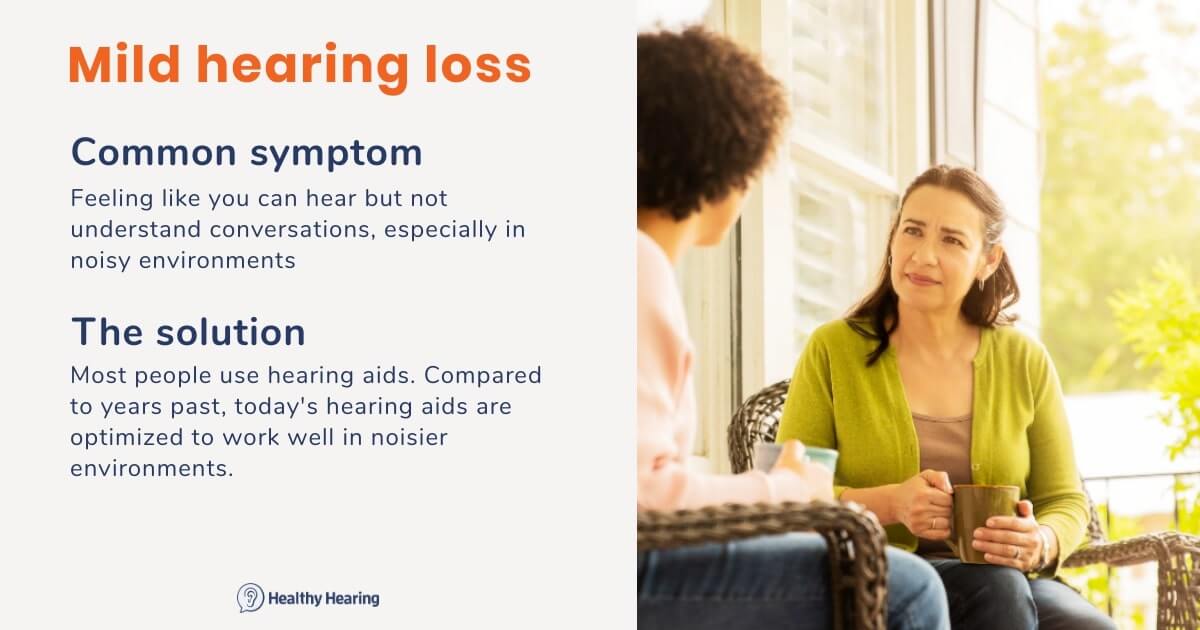|
www.HealthyHearing.com |
Mild hearing lossWhy it happens, how it affects you, and what to do about it
Contributed by Joy Victory, managing editor, Healthy Hearing, and Emily Ostrowski, content manager, Healthy Hearing Key points:
What is mild hearing loss?Hearing loss is measured in degrees of severity. Mild hearing loss is defined by being unable to hear sounds that are quieter than about 25 decibels (dB) for adults and 15 dB for children.
What sounds are harder to hear with mild hearing loss?Many people report a loss of speech clarity, meaning words get harder to distinguish. You also may struggle to hear:
You may struggle with hearing both low-pitched and high-pitched sounds (known as frequency), though most people stop hearing high-frequency pitches first. What causes mild hearing loss?There are many reasons you might receive a diagnosis of mild hearing loss. Some of them, when treated promptly, may result in restored hearing. Causes can range from aging to noise exposure to bone abnormalities. How does mild hearing loss affect my life?
A common complaint that people with mild hearing loss have is that they can hear but not understand. This can make conversations much more difficult. Quality of life issues
"Even with milder forms of hearing loss, there can be negative consequences on personal relationships because people get tired of repeating themselves," said Dr. Julie Prutsman, Au.D, owner and founder of Sound Relief Hearing Center in Fort Collins, CO. Additionally, Dr. Prutsman said that confusion can stem from the fact that people with hearing loss may be able to follow conversations in quieter environments, but when there's any background noise, problems arise. That's because with any degree of hearing loss, your brain has to work harder to compensate and understand sounds. For many with hearing loss, socializing can start to feel not worth it. "Not being able to communicate effectively with any level of noise, even with milder forms of hearing loss, can lead to social isolation or lack of enjoyment with social events," said Dr Prutsman. "In other words, even mild hearing loss can take the fun out of being with groups of people." Is it worth treating milder forms of hearing loss?Yes. Even mild degrees of hearing loss should be evaluated by a specialist and treated. In addition to the toll it can take on your personal relationships, untreated hearing loss can potentially lead to other health problems down the road. Your short-term memory can be negatively impacted due to the increased cognitive load hearing loss puts on your brain. Essentially when you have to work harder to understand speech and other sounds you're using resources that weren't originally intended for speech processing. This can cause other areas of the brain to suffer. "If this strain on the brain continues over time, the concern is even greater that cognitive decline will result," said Dr. Prutsman. Can you prevent mild hearing loss?While not all causes of mild hearing loss are preventable, you can take steps to reduce your risk. The most preventable type of hearing loss is noise-induced hearing loss (NIHL), a condition which affects millions of Americans. Even if you already have hearing loss, it's important to protect your remaining hearing. Many types of hearing protection devices are available. Don't wait to seek treatmentPeople who notice hearing loss wait an average of seven years to seek help with hearing aids. During this time, the hearing loss progresses, and the brain "forgets" how to hear sound properly. "We never like to have to tell a patient that they have waited too long to get hearing correction, but we do occasionally see patients where it is 'too little, too late,'" said Dr. Prutsman. She explained that after a certain time "the brain simply forgets how to decode similar speech sounds due to lack of stimulation, regardless of the level of amplification we provide." She urged that early intervention is the best way to protect your hearing and overall health. Not to mention, modern hearing aids are extremely adept at improving hearing for milder forms of hearing loss. "With prescription hearing devices today that have deep neural networks and AI technology, we can do an excellent job correcting mild hearing loss so that patients feel confident and comfortable participating in background noise again." Frequently asked questionsDo I just need to concentrate more?This is a common sentiment expressed by people with mild hearing loss. However, it's important to know that if you have any degree of hearing loss, the issue isn't concentration or laziness. Your ears and your brain need additional help to process sounds. How much of a difference can hearing aids really make?Other times, people who don't have severe hearing loss have trouble believing that hearing aids could make a difference in their lives. However, in addition to the health benefits, many people are surprised and delighted by all the sounds they can hear again after getting hearing aids. How do I know if I'm a candidate for hearing aids?The majority of people with mild hearing loss are candidates for hearing aids. Hearing aid technology has come a long way, and today's devices are sleek, stylish and customizable to any degree of hearing loss. Hearing aids exist for every lifestyle and budget, and can help keep you connected to those around you. “The digital hearing aids available today do a fantastic job at amplifying the sounds you want to hear while managing the background noise so that an individual can enjoy interacting with others more naturally again,” said Dr. Melissa Danchak, Au.D, of Kos/Danchak Audiology and Hearing Aids in Arlington, Texas. Where do I find a hearing care provider I can trust?The first step to better hearing is to schedule an appointment with a hearing healthcare professional for a hearing evaluation. This initial test acts as a baseline for future examinations so your professional can accurately monitor your hearing health going forward. Get started by visiting our directory to find a consumer-reviewed hearing aid clinic near you. Joy Victory, managing editor, Healthy Hearing
Emily Ostrowski, content manager, Healthy Hearing
|
Featured clinics near me
Earzlink Hearing Care - Reynoldsburg
7668 Slate Ridge Blvd
Reynoldsburg, OH 43068

Find a clinic
We have more hearing clinic reviews than any other site!


.jpg)

 Joy Victory has extensive experience editing consumer health information. Her training in particular has focused on how to best communicate evidence-based medical guidelines and clinical trial results to the public. She strives to make health content accurate, accessible and engaging to the public.
Joy Victory has extensive experience editing consumer health information. Her training in particular has focused on how to best communicate evidence-based medical guidelines and clinical trial results to the public. She strives to make health content accurate, accessible and engaging to the public.
 Emily is an experienced journalist and medical content writer based in Maine. Passionate about delivering enlightening and accurate content, she is committed to empowering people to make informed choices regarding their hearing health.
Emily is an experienced journalist and medical content writer based in Maine. Passionate about delivering enlightening and accurate content, she is committed to empowering people to make informed choices regarding their hearing health.